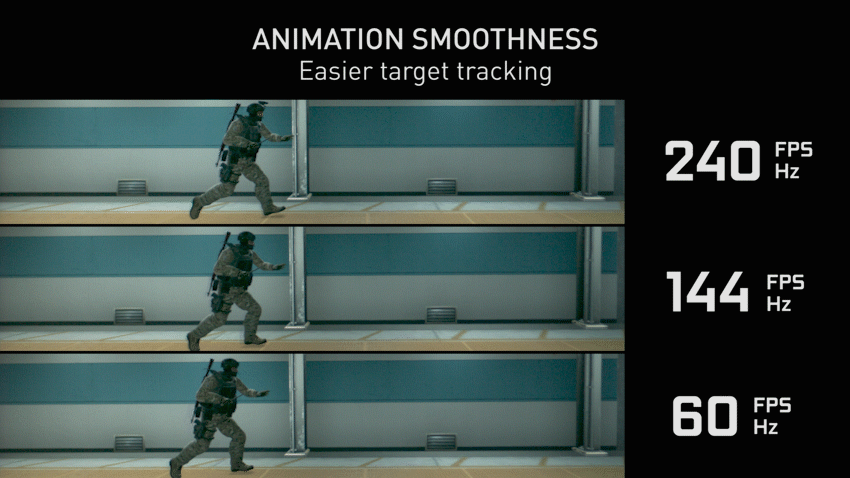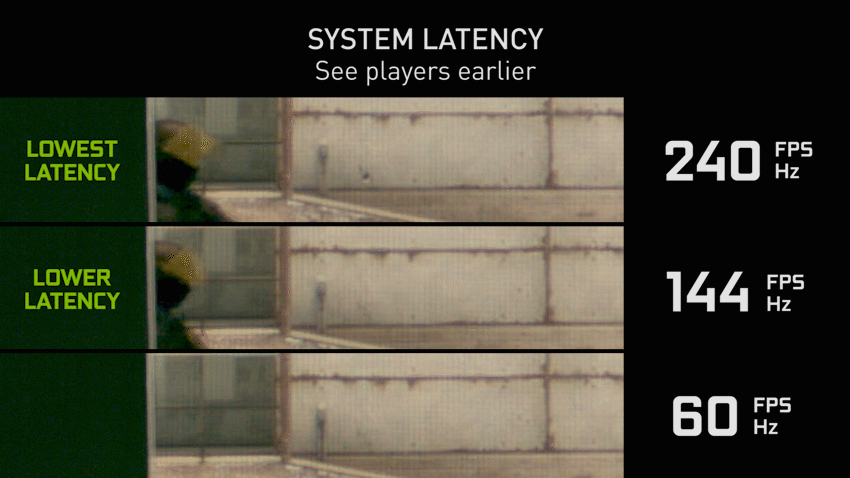Can I Have a 144hz Monitor and a 60hz Monitor
Choosing the correct gaming monitor is equally important every bit choosing the right CPU or graphics card. Ultrawide displays, 4K resolutions, and HDR are among the almost pop features to make games look their absolute best. Another of these features is the refresh rate.
A 60 frames per second (fps) refresh rate used to exist the best feature out in that location, nevertheless games can run well over 100 frames with the proper rig setup. Would changing from a 60Hz monitor to 144Hz wait that much better? The short answer is yes, but with an asterisk beside information technology. The type of PC you have will impact the functioning of your monitor and its refresh rate.
Hertz vs. frames
Understanding what makes 144Hz appealing requires an agreement of how refresh rates piece of work. Frame rate and refresh rates are not the same, merely they do work together. A frame rate measures the number of frames that appear on-screen within a given second and is not solely dictated by a monitor. If a game runs at 60 frames, sixty frames return on-screen in one second. A higher number of frames means smoother video, with fewer frames making the video seem sluggish.
Refresh rates are the number of times the display itself refreshes in a 2d. Hertz (Hz) is the term for refresh rates and refers to the number of times something cycles in a catamenia. If a screen refreshes at the same charge per unit as the frame rate, the video will be smooth unless the frames drop. The same philosophy applies to refresh rates as frame rate; the higher the number, the smoother the video.
Merely because the image is refreshing faster does not mean the game will look whatever amend graphically. A 720p resolution is still going to await like 720p, even if the screen is refreshing faster. But the images on the screen volition await sharper at higher speeds. With that in mind, the beneath GIF is how 60Hz looks compared to 144Hz and 240Hz.
Why 144Hz is improve than 60Hz

Seeing the differences between 60Hz and 144Hz is pretty easy when direct compared. The animation is smoother in the 144Hz instance, merely the frames await like they're skipping in the 60Hz shot. The post-obit example shows a comparing of system latency between the refresh rates.

This example shows a considerable jump in speed, with the soldier actualization faster in the 144Hz test than in the 60Hz example. Low latency is a significant reason why almost gamers prefer 144Hz over 60Hz for competitive games like Counter-Strike or League of Legends.
Another feature competitive gamers will enjoy is less input lag and ghosting. Ghosting is when an object on screen has a double image, or ghost, backside it due to motion blur. Most 144Hz monitors inherently have lower input lag due to better technologies prohibiting a drop below vii milliseconds.
Non-competitive gamers tin still appreciate the increased refresh rate. A monitor displaying a game at 144Hz is less likely to stutter when information technology drops below lx frames. Similarly, 144Hz can help reduce the appearance of screen vehement due to lower latency between the computer and the monitor.
Luckily, 144Hz has speedily go the standard for gaming monitors, with prices dropping each twelvemonth due to fifty-fifty higher refresh rates becoming available. Virtually 144Hz monitors range between $170 and $250 for 1080p resolution, roughly the same price for 60Hz versions. A monitor with a 4K resolution volition still hurt the wallet a bit by hitting in the upper $200 range or higher.
Overall, information technology is worth the extra price to purchase a gaming monitor with a 144Hz refresh charge per unit rather than 60Hz. Smoother animations, less screen tearing, less ghosting, and a scrap of a competitive edge are all reasons to upgrade.
Source: https://dotesports.com/hardware/news/are-144hz-monitors-better-than-60hz
0 Response to "Can I Have a 144hz Monitor and a 60hz Monitor"
Enregistrer un commentaire